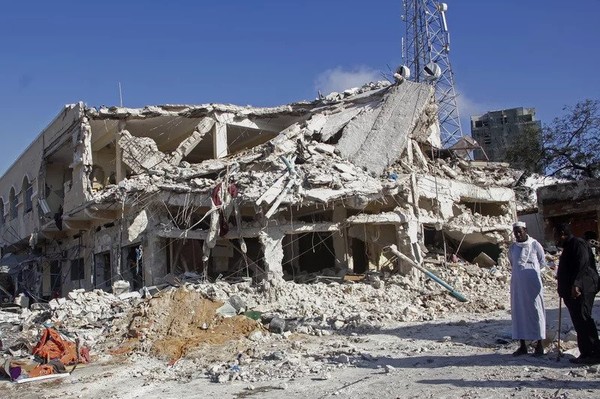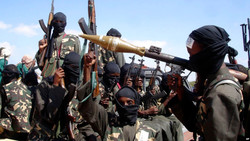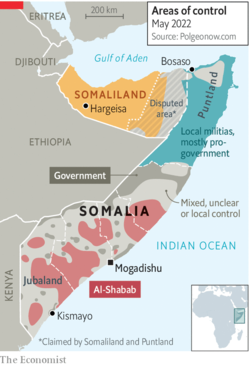The ongoing Russia-Ukraine war that was initiated this February has set Eurasia on fire, though it is not the only continent with the rising smoke. Mogadishu, the capital of Somalia, located on the eastern end of Africa, was recently under attack by radical militants, resulting in a huge destruction of infrastructure and a number of civilian casualties. In response, Somalia's president has requested help from international communities and other countries. The militants responsible for the attack are known to have long-standing conflict not only with Somalia but also with other countries such as the United States, and their conflicts, apparently, are yet to cool down. Follow along and find out the current circumstance of Mogadishu and the group that executed the act of terrorism.

1. Recent Act of Terrorism in Mogadishu
Two vehicles, each loaded with explosives, blew up near a junction in Mogadishu on Saturday, 29 October, slaughtering at least 100 people, President of Somalia, Hassan Sheikh Mohamud, said. The two explosions were a few minutes apart; the first one aimed to damage the Ministry of Education, and the second targeted the rescue team who arrived at the site, Reuters reported. Such acts of terrorism are recurrent; between the 19th and 20th of August this year, the group responsible for the car bombing attacked the Hayat Hotel in Mogadishu. They utilized explosives to secure a pathway into the hotel and opened fire inside the hotel towards the military and security forces for about 30 hours. As a result, the hotel was severely damaged with at least 21 dead and 117 injured. Not only did the Islamist militant al-Shabaab claim responsibility for the attack, but President Mohamud also blamed al-Shabaab for the attack.
2. Al-Shabaab Militant Group
a. Who They Are and What They Aim For

Al-Shabaab is a group of Islamic extremists and is recognized to have a firm tie with al-Qaeda1 and has continuously clashed with the federal government of Somalia. “Shabaab” of al-Shabaab means youth, and as its name implies, the members of the group are mainly the youth, even including juvenile soldiers. They were part of the Union of Islamic Court (ICU)2, which used to rule Mogadishu, but they broke off as an independent organization in 2006 when the Ethiopian forces overthrew the ICU. Al-Shabaab has been engaged in terrorist acts and skirmishes for about 15 years with Somalia’s federal government to regain control of Mogadishu. The underlying conviction they uphold that classifies them as a terrorist group is that they follow Wahhabism, while most Somalis are Sufis. Sufism pursuits collaboration with modernism, while Wahhabi, on the other hand, is closer to tradition. They, therefore, follow Sharia, the religious law of Islamic tradition, that allows extreme punishments such as stoning women accused of adultery to death and amputating the hands of thieves.
b. Al-Shabaab’s Influence Over Somalia

The reason al-Shabaab is gaining much attention is due to its both international and domestic influences in Somalia. After the hotel siege in August, President Mohamud declared “total war” against al-Shabaab. He furthermore admitted that the militant body cannot be easily eradicated, let alone by forces, as he stated: "The bombings were a message sent by the militants to show that they are still alive, despite the fact that they were defeated in battlefield by government forces."3 In addition, their financial status is superior to other groups of Islamic terrorists. The United States African Command announced this October that al-Shabaab collects about $100M worth of tax from southern and central Somalia where they currently have dominant control. The Mogadishu-based Hiraal Institute think tank assumes that they annually spend about $24M buying ammunitions and firearms. In response, the U.S. Departments of Treasury and State and President Mohamud have been attempting to identify and cut their funding streams, but many experts agree that it is easier said than done. Some even evaluate the group as having developed a parallel government as the federal government, adding that it’s no surprise they are evaluated to be the most successful Islamic extremist group since they have established ties with al-Qaeda.
3. Global Responses: Lingering Tension with Foreign Associations
a. The International community Castigates al-Shabaab’s Acts.
The international community is well-aware of their ruthless, reckless affairs. Muleya Mwananyanda, director for East and Southern Africa at Amnesty International, heavily criticized al-Shabaab’s moves on twin car bombing as he said “Al-Shabaab must immediately stop carrying out attacks on civilians, and the Somali authorities must ensure that victims’ families are offered justice, truth and reparation.” Members of the United Nations Security Council Press that was held on 1 November once again accentuated that such act of terrorism is an indisputable felony, which cannot be justified under any circumstance.
b. Intervention of the United States
Somalia has been receiving attention and support from foreign countries, and the United States is one of them. The story between the United States and Somalia goes back to 1960, when the U.S. formally established diplomatic relations with Somalia. The rebellion against the government broke out in 1980s grew into an even greater fight which became known as the Somali Civil War in 1991. The U.S. also engaged in the clash, opposing the anti-government activists, which became the root of al-Shabaab.4 The battle between the U.S. and al-Shabaab continues to this day. The United States Africa Command made an announcement, claiming that U.S. forces and the Somali federal government carried out an airstrike on 1 October, eliminating Abdullahi Nadir, one of the candidates to be the leader of al-Shabaab, without civilian casualties.
Somalia this year has already experienced massive damage to infrastructures and the public followed by consecutive attacks in public spaces. The long-lasting history of Somalia’s government and al-Shabaab has shown that they each uphold different values: the decisive factor that has initiated the dispute which almost seems irremediable today. Nonetheless, al-Shabaab must reflect on the impact and the significance of their activities, or perhaps why the international communities recognize them as terrorists. While many countries are paying attention and trying to mediate the discord between the two, no sharp measures seem to make any evident progress. Chung-Ang Herald hopes for a desirable arbitration to be made that causes no more innocent victims.
1) An Islamic militant group, founded by Osama bin Laden, the one who planned the September 11 attacks. They are often called the al-Qaeda Network as they are well-known to be one of the biggest patrons of Islamic extremists. Prominent groups they have link with include the Taliban and al-Shabaab.
2) In 1991, a coup was successful in overthrowing the president of Somalia, Siad Barre, but it soon gave rise to additional coup which rebelled against the first, leading to almost two decades of anarchy. Around the end of the civil war, the ICU was founded to reestablish Islamic order.
3) Reported by BBC in October, 2022.
4) Their collision later became the motive for the famous movie “Black Hawk Down”.

